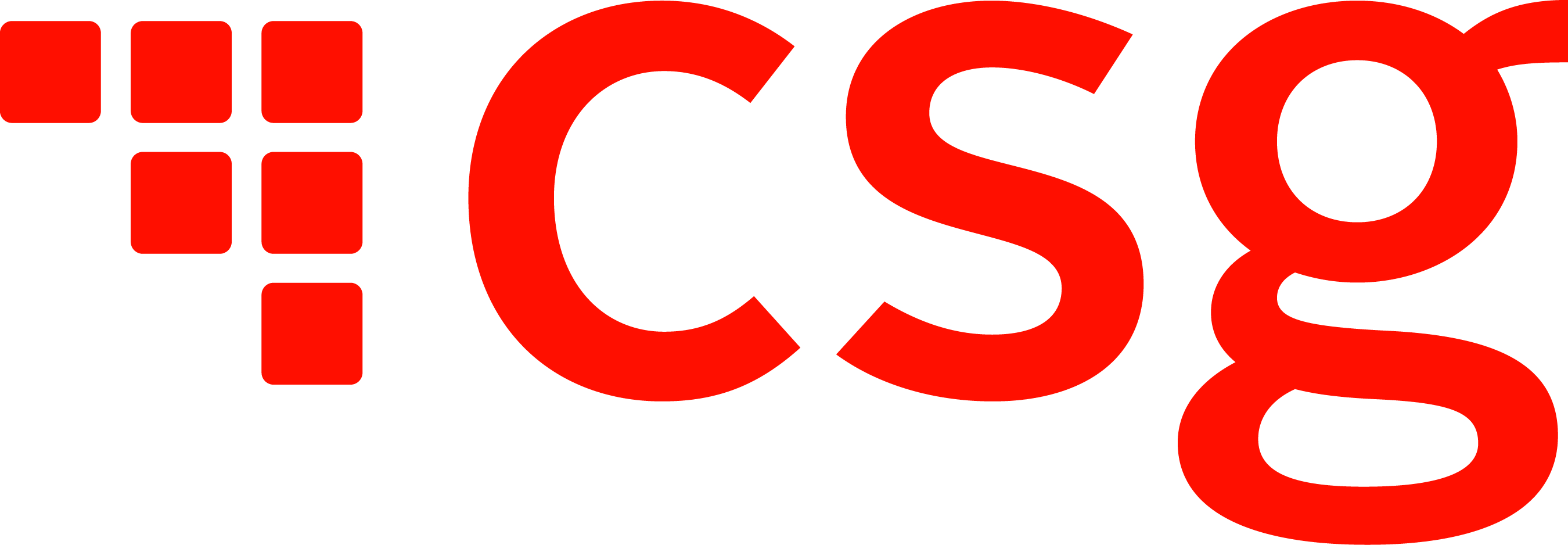 News Release
News ReleaseCSG Systems International Reports Third Quarter 2021 Results
CSG
Reconfirming All 2021 Financial Guidance Targets; Preliminary 2022 Targets Announced Robust Q3 2021 Revenue & Adjusted Revenue Growth Up 7.8% and 8.5% Year-Over-Year Signed Landmark Charter Communications Contract Extension and Expansion through 2027 Successful Conversion of ~800,000 Charter Communications Customers in Midwest Signed DISH Network Contract Extension Through Mid-2026 CSG (NASDAQ: CSGS) today reported results for the quarter ended September 30, 2021. Financial Results: Third quarter 2021 financial results: Total revenue was $263.2 million and total non-GAAP adjusted revenue was $247.0 million. GAAP operating income was $32.8 million, or 12.4% of total revenue, and non-GAAP operating income was $41.6 million, or 16.8% of non-GAAP adjusted revenue. GAAP earnings per diluted share (EPS) was $0.50 and non-GAAP EPS was $0.88. Cash flows used in operations were $46.1 million, with a non-GAAP free cash flow of $38.7 million. Shareholder Returns: In August 2021, CSG declared its quarterly cash dividend of $0.25 per share of common stock, or a total of approximately $8 million, to shareholders. During the third quarter of 2021, CSG repurchased under its stock repurchase program, approximately 143,000 shares of its common stock for approximately $7 million. Business Activities: In September 2021, CSG refinanced its existing credit agreement, extending the term of the agreement through September 2026, and increasing the revolving credit facility from $200 million to $450 million. In October 2021, CSG extended its contract with Charter, its largest client, through December 31, 2027. In October 2021, CSG extended its contract with DISH through June 30, 2026. “Our third quarter results and the landmark Charter contract expansion highlight the excellent momentum we currently have across our global business,” said Brian Shepherd, President and Chief Executive Officer of CSG. “With regards to the six-year Charter contract, which represents the largest deal ever signed in CSG’s history, we are extremely proud to become the revenue management provider of choice for all 32 million Charter subscribers across their residential and small-and-medium-sized business footprints. Additionally, we reported a robust set of financial results highlighted by our best quarterly organic revenue and adjusted revenue growth results since Q3 2010. And on the back of our strong year-to-date 2021 results, our continued sales success in the market, and the exciting renewals at both Charter and DISH Network, we are pleased to issue growth-oriented 2022 preliminary financial guidance targets. Looking ahead, CSG remains well positioned to create meaningful value for our customers, our employees and our shareholders as we lengthen and strengthen our relationships with existing customers, accelerate our organic revenue growth, close good new strategic acquisitions, and diversify into higher growth industry verticals.” Financial Overview (unaudited) (in thousands, except per share amounts and percentages): For additional information and reconciliations regarding CSG’s use of non-GAAP financial measures, please refer to the attached Exhibit 2 and the Investor Relations section of CSG’s website at csgi.com. Results of Operations GAAP Results: Total revenue for the third quarter of 2021 was $263.2 million, a 7.8% increase when compared to revenue of $244.1 million for the third quarter of 2020, and a 3.2% increase when compared to revenue of $255.1 million for the second quarter of 2021. These increases in revenue can be primarily attributed to the continued growth of CSG’s revenue management solutions, as substantially all was attributed to organic growth year-over-year. GAAP operating income for the third quarter of 2021 was $32.8 million, or 12.4% of total revenue, compared to $28.9 million, or 11.9% of total revenue, for the third quarter of 2020, and $32.2 million, or 12.6% of total revenue, for the second quarter of 2021. The increase in year-over-year operating income can be primarily attributed to the revenue growth in 2021. GAAP EPS for the third quarter of 2021 was $0.50, as compared to $0.42 for the third quarter of 2020, and $0.60 for the second quarter of 2021. GAAP EPS for the third quarter of 2021 was impacted by a $6.2 million loss, or $0.14 per share, recorded on obtaining a controlling interest in a pre-existing equity investment. Non-GAAP Results: Non-GAAP adjusted revenue for the third quarter of 2021 was $247.0 million, an 8.5% increase when compared to non-GAAP adjusted revenue of $227.7 million for the third quarter of 2020, and a 3.6% increase when compared to $238.5 million for the second quarter of 2021. Non-GAAP operating income for the third quarter of 2021 was $41.6 million, or 16.8% of total non-GAAP adjusted revenue, compared to $39.1 million, or 17.2% of total non-GAAP adjusted revenue for the third quarter of 2020, and $39.8 million, or 16.7% of total non-GAAP adjusted revenue for the second quarter of 2021. Non-GAAP EPS for the third quarter of 2021 was $0.88 compared to $0.76 for the third quarter of 2020, and $0.82 for the second quarter of 2021. The changes in non-GAAP adjusted revenue and non-GAAP operating income between quarters are primarily due to the factors discussed above. Balance Sheet and Cash Flows Cash, cash equivalents and short-term investments as of September 30, 2021 were $224.5 million compared to $212.1 million as of June 30, 2021 and $240.3 million as of December 31, 2020. CSG had net cash flows from operations for the third quarters ended September 30, 2021 and 2020 of $46.1 million and $65.3 million, respectively, and had non-GAAP free cash flow of $38.7 million and $55.4 million, respectively. Summary of Financial Guidance CSG is reaffirming its financial guidance for the full year 2021 and providing a preliminary financial outlook for certain full year 2022 financial measures, as follows: For additional information and reconciliations regarding CSG’s use of non-GAAP financial measures, please refer to the attached Exhibit 2 and the Investor Relations section of CSG’s website at csgi.com. Conference Call CSG will host a conference call on Wednesday, November 3, 2021 at 5:00 p.m. ET, to discuss CSG’s third quarter 2021 earnings results. The call will be carried live and archived on the Internet. A link to the conference call is available at http://ir.csgi.com. In addition, to reach the conference by phone, call 1-888-440-4531 and use the passcode 6134021. Additional Information For information about CSG, please visit CSG’s web site at csgi.com. Additional information can be found in the Investor Relations section of the website. About CSG CSG is a leader in innovative customer engagement, revenue management and payments solutions that make ordinary customer experiences extraordinary. Our cloud-first architecture and customer-obsessed mindset help companies around the world launch new digital services, expand into new markets, and create dynamic experiences that capture new customers and build brand loyalty. For nearly 40 years, CSG’s technologies and people have helped some of the world’s most recognizable brands solve their toughest business challenges and evolve to meet the demands of today’s digital economy with future-ready solutions that drive exceptional customer experiences. With 5,000 employees in over 20 countries, CSG is the trusted technology provider for leading global brands in telecommunications, retail, financial services and healthcare. Our solutions deliver real world outcomes to more than 900 customers in over 120 countries. To learn more, visit us at csgi.com and connect with us on LinkedIn and Twitter. Forward-Looking Statements This news release contains forward-looking statements as defined under the Securities Act of 1933, as amended, that are based on assumptions about a number of important factors and involve risks and uncertainties that could cause actual results to differ materially from what appears in this news release. Some of these key factors include, but are not limited to the following items: • CSG’s business may be disrupted, and its results of operations and cash flows adversely affected by the COVID-19 pandemic; • CSG derives over forty percent of its revenue from its two largest customers; • Continued market acceptance of CSG’s products and services; • CSG’s ability to continuously develop and enhance products in a timely, cost-effective, technically advanced and competitive manner; • CSG’s ability to deliver its solutions in a timely fashion within budget, particularly large and complex software implementations; • CSG’s dependency on the global telecommunications industry, and in particular, the North American telecommunications industry; • CSG’s ability to meet its financial expectations; • Increasing competition in CSG’s market from companies of greater size and with broader presence; • CSG’s ability to successfully integrate and manage acquired businesses or assets to achieve expected strategic, operating and financial goals; • CSG’s ability to protect its intellectual property rights; • CSG’s ability to maintain a reliable, secure computing environment; • CSG’s ability to conduct business in the international marketplace; • CSG’s ability to comply with applicable U.S. and International laws and regulations; and • Fluctuations in credit market conditions, general global economic and political conditions, and foreign currency exchange rates. This list is not exhaustive, and readers are encouraged to review the additional risks and important factors described in CSG’s reports on Forms 10-K and 10-Q and other filings made with the SEC. For more information, contact: John Rea, Investor Relations (210) 687-4409 E-mail: john.rea@csgi.com CSG SYSTEMS INTERNATIONAL, INC. CONDENSED CONSOLIDATED BALANCE SHEETS-UNAUDITED (in thousands) CSG SYSTEMS INTERNATIONAL, INC. CONDENSED CONSOLIDATED STATEMENTS OF INCOME-UNAUDITED (in thousands, except per share amounts) CSG SYSTEMS INTERNATIONAL, INC. CONDENSED CONSOLIDATED STATEMENTS OF CASH FLOWS-UNAUDITED (in thousands) Beginning with the second quarter of 2021, CSG reclassified certain cash flows related to settlement and merchant reserve assets and liabilities from cash flows from operating activities to cash flows from financing activities within the Condensed Consolidated Statements of Cash Flows. Prior period amounts have been reclassified to conform to the current period presentation. EXHIBIT 1 CSG SYSTEMS INTERNATIONAL, INC. SUPPLEMENTAL REVENUE ANALYSIS Revenue by Significant Customers: 10% or more of Revenue Revenue by Vertical Revenue by Geography EXHIBIT 2 CSG SYSTEMS INTERNATIONAL, INC. DISCLOSURES FOR NON-GAAP FINANCIAL MEASURES Use of Non-GAAP Financial Measures and Limitations To supplement its condensed consolidated financial statements presented in accordance with generally accepted accounting principles (GAAP), CSG uses non-GAAP adjusted revenue, non-GAAP operating income, non-GAAP adjusted operating margin percentage, non-GAAP EPS, non-GAAP adjusted EBITDA, and non-GAAP free cash flow. CSG believes that these non-GAAP financial measures, when reviewed in conjunction with its GAAP financial measures, provide investors with greater transparency to the information used by CSG’s management in its financial and operational decision making. CSG uses these non-GAAP financial measures for the following purposes: • Certain internal financial planning, reporting, and analysis; • Forecasting and budgeting; • Certain management compensation incentives; and • Communications with CSG’s Board of Directors, stockholders, financial analysts, and investors. These non-GAAP financial measures are provided with the intent of providing investors with the following information: • A more complete understanding of CSG’s underlying operational results, trends, and cash generating capabilities; • Consistency and comparability with CSG’s historical financial results; and • Comparability to similar companies, many of which present similar non-GAAP financial measures to investors. Non-GAAP financial measures are not measures of performance under GAAP, and therefore should not be considered in isolation or as a substitute for GAAP financial information. Limitations with the use of non-GAAP financial measures include the following items: • Non-GAAP financial measures are not based on any comprehensive set of accounting rules or principles; • The way in which CSG calculates non-GAAP financial measures may differ from the way in which other companies calculate similar non-GAAP financial measures; • Non-GAAP financial measures do not include all items of income and expense that affect CSG’s operations and that are required by GAAP to be included in financial statements; • Certain adjustments to CSG’s non-GAAP financial measures result in the exclusion of items that are recurring and will be reflected in CSG’s financial statements in future periods; and • Certain charges excluded from CSG’s non-GAAP financial measures are cash expenses, and therefore do impact CSG’s cash position. CSG compensates for these limitations by relying primarily on its GAAP results and using non-GAAP financial measures as a supplement only. Additionally, CSG provides specific information regarding the treatment of GAAP amounts considered in preparing the non-GAAP financial measures and reconciles each n on-GAAP financial measure to the most directly comparable GAAP measure. Non-GAAP Financial Measures: Basis of Presentation The table below outlines the exclusions from CSG’s non-GAAP financial measures: CSG believes that excluding certain items in calculating its non-GAAP financial measures provides meaningful supplemental information regarding CSG’s performance and these items are excluded for the following reasons: Transaction fees are primarily comprised of interchange and other payment-related fees paid, in conjunction with the delivery of service to customers under CSG’s payment services contracts, to third-party payment processors and financial institutions by CSG. Because CSG controls the integrated service provided under its payment services customer contracts, these transaction fees are presented gross, and not netted against revenue; however, other payments companies who do not provide and/or control an integrated service present their revenue net of transaction fees. The exclusion of these fees in calculating CSG’s non-GAAP adjusted revenue provides management and investors an additional means to use to compare CSG’s current revenue with historical and future periods, as well as with other payments companies. Restructuring and reorganization charges are expenses that result from cost reduction initiatives and/or significant changes to CSG’s business, to include such things as involuntary employee terminations, changes in management structure, divestitures of businesses, facility consolidations and abandonments, and fundamental reorganizations impacting operational focus and direction. These charges are not considered reflective of CSG’s recurring business operating results. The exclusion of these items in calculating CSG’s non-GAAP financial measures allows management and investors an additional means to compare CSG’s current financial results with historical and future periods. Executive transition costs include expenses incurred related to a departure of a CSG executive officer under the terms of the related separation agreement. These types of costs are not considered reflective of CSG’s recurring business operating results. The exclusion of these costs in calculating CSG’s non-GAAP financial measures allows management and investors an additional means to compare CSG’s current financial results with historical and future periods. • Acquisition-related expenses include amortization of acquired intangible assets, earn-out compensation, and transaction-related costs. Transaction-related costs, which typically include expenses related to legal, accounting, and other professional services, are direct and incremental expenses related to business acquisitions, and thus, are not considered reflective of CSG’s recurring business operating results. The total amount of acquisition-related expenses can vary significantly between periods based on the number and size of acquisition activities, previously acquired intangible assets becoming fully amortized, and ultimate realization of earn-out compensation. In addition, the timing of these expenses may not directly correlate with underlying performance of the CSG’s operations. Therefore, the exclusion of acquisition-related expenses in calculating CSG’s non-GAAP financial measures allows management and investors an additional means to compare CSG’s current financial results with historical and future periods. • Stock-based compensation results from CSG’s issuance of equity awards to its employees under incentive compensation programs. The amount of this incentive compensation in any period is not generally linked to the level of performance by employees or CSG. The exclusion of these expenses in calculating CSG’s non-GAAP financial measures allows management and investors an additional means to evaluate the non-cash expense related to compensation included in CSG’s results of operations, and therefore, the exclusion of this item allows investors to further evaluate the cash generating capabilities of CSG’s business. • The convertible notes OID is the result of allocating a portion of the principal balance of the debt at issuance to the equity component of the instrument, as required under current accounting rules. This OID is then amortized to interest expense over the life of the respective convertible debt instrument. The interest expense related to the amortization of the OID is a non-cash expense, and therefore, the exclusion of this item allows investors to further evaluate the cash interest costs of CSG’s convertible notes for cash flow, liquidity, and debt service purposes. Gains and losses related to the extinguishment of debt are a result of the refinancing of CSG’s credit agreement and/or repurchase of CSG’s convertible notes. These activities are not considered reflective of CSG’s recurring business operating results. Any resulting gain or loss is generally non-cash income or expense, and therefore, the exclusion of these items allows investors to further evaluate the cash impact of these activities for cash flow and liquidity purposes. In addition, the exclusion of these gains and losses in calculating CSG’s non-GAAP EPS allows management and investors an additional means to compare CSG’s current operating results with historical and future periods. Gains or losses related to the acquisition or disposition of certain of CSG’s business activities are not considered reflective of CSG’s recurring business operating results. Any resulting gain or loss is generally non-cash income or expense, and therefore, the exclusion of these items allows investors to further evaluate the cash impact of these activities for cash flow and liquidity purposes. In addition, the exclusion of these gains and losses in calculating CSG’s non-GAAP EPS allows management and investors an additional means to compare CSG’s current operating results with historical and future periods. Unusual items within CSG’s quarterly and/or annual income tax expense can occur from such things as income tax accounting timing matters, income taxes related to unusual events, or as a result of different treatment of certain items for book accounting and income tax purposes. Consideration of such items in calculating CSG’s non-GAAP financial measures allows management and investors an additional means to compare CSG’s current financial results with historical and future periods. CSG also reports non-GAAP adjusted EBITDA and non-GAAP free cash flow. Management believes non-GAAP adjusted EBITDA is a useful measure to investors in evaluating CSG’s operating performance, debt servicing capabilities, and enterprise valuation. CSG defines non-GAAP adjusted EBITDA as income before interest, income taxes, depreciation, amortization, stock-based compensation, foreign currency transaction adjustments, acquisition-related expenses, and unusual items, such as restructuring and reorganization charges, executive transition costs, gains and losses related to the extinguishment of debt, and gains and losses on acquisitions or dispositions, as discussed above. Additionally, management uses non-GAAP free cash flow, among other measures, to assess its financial performance and cash generating capabilities, and believes that it is useful to investors because it shows CSG’s cash available to service debt, make strategic acquisitions and investments, repurchase its common stock, pay cash dividends, and fund ongoing operations. CSG defines non-GAAP free cash flow as net cash flows from operating activities less the purchases of software, property and equipment. Non-GAAP Financial Measures Non-GAAP Adjusted Revenue: The reconciliations of GAAP revenue to non-GAAP adjusted revenue for the indicated periods are as follows (in thousands): Non-GAAP Operating Income: The reconciliations of GAAP operating income to non-GAAP operating income for the indicated periods are as follows (in thousands, except percentages): (1) Stock-based compensation included in the tables above and following excludes amounts that have been recorded in restructuring and reorganization charges. Non-GAAP EPS: The reconciliations of GAAP EPS to non-GAAP EPS for the indicated periods are as follows (in thousands, except per share amounts): (2) During the third quarter of 2021, CSG acquired a controlling interest in a mobile money fintech payment company that it previously held only an equity interest in. Upon acquisition of the controlling interest, CSG recognized a non-cash loss in other income (expense) related to the fair value remeasurement of the pre-existing equity investment. (3) For the third quarter and nine months ended September 30, 2021 the GAAP effective income tax rate was approximately 28% for both periods, and the non-GAAP effective income tax rate was approximately 27% for both periods. For the third quarter and nine months ended September 30, 2020 the GAAP effective income tax rates were approximately 40% and 31%, respectively, and the non-GAAP effective income tax rate was approximately 27% for both periods. The difference between the GAAP and non-GAAP effective income tax rates was due primarily to the unfavorable GAAP basis tax impact related to the separation agreement entered into during the third quarter of 2020 with CSG’s then CEO. (4) The outstanding diluted shares for the third quarter and nine months ended September 30, 2021 and 2020 were 32.0 million and 32.3 million for both periods, respectively. Non-GAAP Adjusted EBITDA: CSG’s calculation of non-GAAP adjusted EBITDA and the reconciliation of CSG’s non-GAAP adjusted EBITDA measure to GAAP net income is provided below for the indicated periods (in thousands, except percentages): (5) Interest expense includes amortization of deferred financing costs as provided in Note 5 below. (6) Amortization on the statement of cash flows is made up of the following items for the indicated periods (in thousands): (7) Included in interest and investment income and other, net is the $6.2 million loss on acquisition of controlling interest, discussed above. Non-GAAP Free Cash Flow: CSG’s calculation of non-GAAP free cash flow and the reconciliation of CSG’s non-GAAP free cash flow measure to cash flows from operating activities are provided below for the indicated periods (in thousands): Non-GAAP Financial Measures – 2021 Financial Guidance Refer to the “Non-GAAP Financial Measures – 2021 Financial Guidance” in Exhibit 2 to CSG’s earnings release dated August 4, 2021, which can be found on the Investor Relations page of CSG’s website at csgi.com for the reconciliation of our 2021 financial guidance. Non-GAAP Financial Measures – 2022 Preliminary Financial Outlook Non-GAAP Adjusted Revenue: The reconciliation of GAAP revenue to non-GAAP adjusted revenue, as included in CSG’s 2022 full year preliminary financial outlook, is as follows: Contact Details CSG John Rea +1 210-687-4409 john.rea@csgi.com Company Website https://www.csgi.com
November 03, 2021 02:05 PM Mountain Daylight Time







